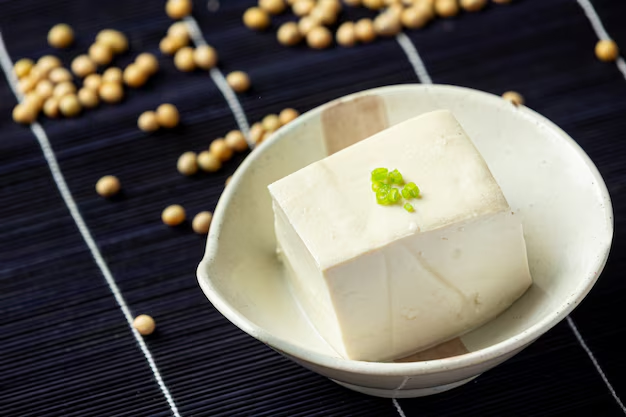Tofu has become a staple for those seeking nutritious and plant-based protein options. Known for its versatility and health benefits, tofu serves as a vital component of many diets. Protein, a crucial macronutrient, is essential for muscle repair, immunity, and overall health. This article will explore tofu’s protein content, nutritional value, and how it compares to other protein sources to determine if tofu is truly a high-protein food.
Understanding Tofu
Tofu’s origins and its nutritional versatility make it a standout plant-based food. Let’s dive deeper into what tofu is and why it has gained popularity worldwide.
What Is Tofu?
Tofu, also known as bean curd, originates from East Asia and has been consumed for centuries. Made from soybeans, it is created through a process of coagulating soy milk and pressing the curds into solid blocks.
Types of Tofu:
- Silken Tofu: Creamy and smooth, ideal for soups and desserts.
- Soft Tofu: Slightly firmer than silken, suitable for recipes requiring delicate textures.
- Firm Tofu: Holds its shape well, perfect for frying or grilling.
- Extra-Firm Tofu: The sturdiest type, used for dishes needing dense texture.
Tofu’s adaptability makes it a great addition to various cuisines, from stir-fries to smoothies.
Nutritional Profile of Tofu
Tofu is nutrient-dense, offering a balance of macronutrients and essential vitamins and minerals.

Macronutrients:
- Protein: High protein content, making it an excellent meat alternative.
- Fats: Contains healthy unsaturated fats, particularly omega-3 fatty acids.
- Carbohydrates: Low in carbs, making it suitable for low-carb diets.
Micronutrients:
- Calcium: Supports bone health.
- Iron: Important for red blood cell production.
- Magnesium: Aids in muscle function and energy production.
- B Vitamins: Essential for metabolic processes.
Protein Content in Tofu
Tofu is frequently touted as a protein powerhouse. But how much protein does it actually provide, and is it enough for your dietary needs?
How Much Protein Does Tofu Contain?
The protein content of tofu depends on the type and serving size. Here’s a breakdown:
- Per 100g:
- Silken tofu: ~5g of protein.
- Firm tofu: ~10g of protein.
- Extra-firm tofu: ~12g of protein.
- Per Cup (150g):
- Silken tofu: ~7.5g.
- Firm tofu: ~15g.
- Extra-firm tofu: ~18g.
Comparison Between Tofu Types:
- Firm and extra-firm tofu have higher protein concentrations due to their lower water content.
- Silken tofu, though softer, is still a good source of protein for lighter meals or smoothies.
Is Tofu a Complete Protein?
A complete protein contains all nine essential amino acids that the body cannot produce on its own.
Amino Acid Profile of Tofu:
- Tofu is a complete protein.
- It provides all essential amino acids, though it is slightly lower in methionine compared to animal proteins.
Despite this, tofu’s protein quality is sufficient to meet dietary needs, especially when combined with other foods like grains or legumes.
Related to Read: Does Cottage Cheese Have Protein?
Comparing Tofu to Other Protein Sources
To truly understand tofu’s value, let’s compare it to both animal-based and plant-based proteins.
Tofu vs. Animal-Based Proteins
Animal proteins like chicken, beef, and dairy are often considered the gold standard. Here’s how tofu measures up:
Protein Content Comparison (Per 100g):
- Chicken breast: ~31g protein.
- Beef: ~26g protein.
- Tofu (firm): ~10g protein.
Health Benefits of Tofu:
- Lower Saturated Fat: Unlike meat, tofu is low in unhealthy fats.
- Heart Health: Rich in isoflavones, which can reduce cholesterol levels.
- Sustainability: Producing tofu has a smaller environmental footprint than raising livestock.
Tofu vs. Other Plant-Based Proteins
Tofu is one of many plant-based protein options. Let’s compare it with some common alternatives:
Protein Content Comparison:
- Lentils: ~9g protein per 100g.
- Chickpeas: ~8g protein per 100g.
- Almonds: ~6g protein per 100g.
- Firm Tofu: ~10g protein per 100g.
Advantages of Tofu Over Other Plant Proteins:
- Complete Protein: Unlike most legumes and nuts, tofu contains all essential amino acids.
- Versatility: Can be used in savory and sweet dishes.
- Low Calorie Density: Provides protein without excessive calories, making it suitable for weight management.
Health Benefits of Including Tofu in Your Diet
Tofu is not just a versatile ingredient; it is a nutritional powerhouse that provides numerous health benefits. From improving heart health to supporting weight management, tofu is an excellent addition to any diet. In this section, we’ll delve into the specific ways tofu can improve your overall well-being.
Cardiovascular Health
Maintaining heart health is a priority for many, and tofu can play a pivotal role in achieving this goal.
Impact on Cholesterol Levels
Tofu is rich in isoflavones, plant-based compounds that have been shown to reduce LDL (bad) cholesterol levels. By replacing animal-based proteins like red meat with tofu, you can help decrease cholesterol and lower the risk of heart disease.
Heart Health Benefits
Tofu is low in saturated fats and free of dietary cholesterol. This makes it an excellent choice for those looking to maintain healthy arteries and improve circulation. Regular tofu consumption has been linked to reduced blood pressure and improved heart function.
Bone Health
Strong bones require a steady intake of essential nutrients, and tofu offers just that.
Calcium Content and Bone Density
Many tofu varieties, especially calcium-set tofu, are high in calcium—a vital mineral for bone strength. This makes tofu a great option for those who are lactose intolerant or looking for non-dairy sources of calcium.
Isoflavones and Bone Health
Isoflavones in tofu also contribute to maintaining bone density, especially in postmenopausal women at risk for osteoporosis. Incorporating tofu into your diet can help reduce the likelihood of bone fractures and other bone-related issues.
Weight Management
Tofu’s nutrient profile makes it a valuable food for weight loss and management.
Low-Calorie, High-Protein Benefits
Tofu is low in calories but high in protein, making it a filling option that can help curb hunger without excessive calorie intake. Protein is known to boost metabolism and aid in fat loss, which makes tofu an ideal food for weight management.
Versatility for Weight Loss Diets
From salads to stir-fries, tofu can easily be incorporated into meals, helping to reduce the consumption of calorie-dense foods. It’s a perfect choice for those looking to shed a few pounds while maintaining energy levels.
How to Incorporate Tofu into Your Meals
Making tofu a regular part of your diet is easier than you might think. With its versatility, tofu can fit seamlessly into meals for any time of the day.

Cooking Methods
Cooking tofu is simple, and different methods bring out unique flavors and textures:
- Baking: Creates a firm texture, ideal for salads and grain bowls.
- Grilling: Adds a smoky flavor and charred texture, perfect for sandwiches or skewers.
- Stir-Frying: Absorbs flavors from sauces and spices, making it a great addition to Asian-inspired dishes.
- Blending: Silken tofu can be blended into smoothies, soups, or desserts for added creaminess.
Recipe Ideas
Tofu can be used in a variety of dishes for every meal:
- Breakfast: Scrambled tofu with vegetables and spices as a protein-rich alternative to eggs.
- Lunch: Grilled tofu wraps with hummus and fresh greens.
- Dinner: Stir-fried tofu with broccoli and teriyaki sauce over brown rice.
- Snacks: Baked tofu nuggets served with a tangy dipping sauce.
Tips for Enhancing Flavor and Texture
- Marinating Techniques: Marinate tofu for at least 30 minutes to infuse it with flavors like soy sauce, garlic, and ginger.
- Pressing Tofu: Press out excess water to improve texture and help it absorb marinades better.
- Pairing: Combine tofu with bold flavors like chili, garlic, or curry spices to elevate its taste.
Considerations and Potential Concerns
While tofu is a highly beneficial food, it’s important to be aware of certain factors when consuming it.
Allergies and Sensitivities
Some individuals may have soy allergies, which can cause reactions ranging from mild to severe. If you’re allergic to soy, consult a healthcare provider before adding tofu to your diet.
Genetically Modified Organisms (GMOs)
Soy is one of the most commonly genetically modified crops. To ensure the tofu you consume is free of GMOs, opt for products labeled organic or non-GMO certified.
Environmental Impact
Tofu production is significantly more sustainable than animal farming. It requires fewer resources like water and land, making it an eco-friendly choice. Supporting tofu consumption over meat can reduce your carbon footprint.
Conclusion
Tofu is a nutrient-rich, high-protein food that offers numerous health benefits, from improving heart health to aiding in weight management. Its versatility and adaptability make it easy to include in a balanced diet. Whether you’re looking to boost your protein intake or try new plant-based recipes, tofu is a fantastic choice. Making informed dietary decisions will not only improve your health but also contribute to a more sustainable world.
Frequently Asked Questions (FAQs)
1. Is tofu a good source of protein for vegetarians and vegans?
Yes, tofu is an excellent source of plant-based protein and provides all nine essential amino acids.
2. How does tofu’s protein content compare to meat?
While tofu has less protein per serving than meat, it offers additional benefits like being low in saturated fats and cholesterol-free.
3. Can I eat tofu every day?
Yes, tofu can be safely eaten daily as part of a balanced diet. However, moderation is key, especially for those with thyroid concerns.
4. What are the best ways to cook tofu to retain its protein content?
Grilling, baking, or stir-frying are great methods to preserve tofu’s protein content while enhancing its flavor.
5. Are there any health risks associated with eating tofu?
For most people, tofu is safe to eat. However, those with soy allergies or thyroid issues should consult a doctor before incorporating tofu into their diet.

